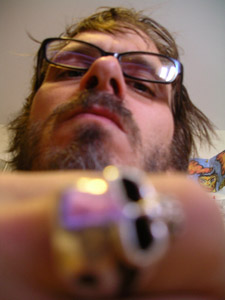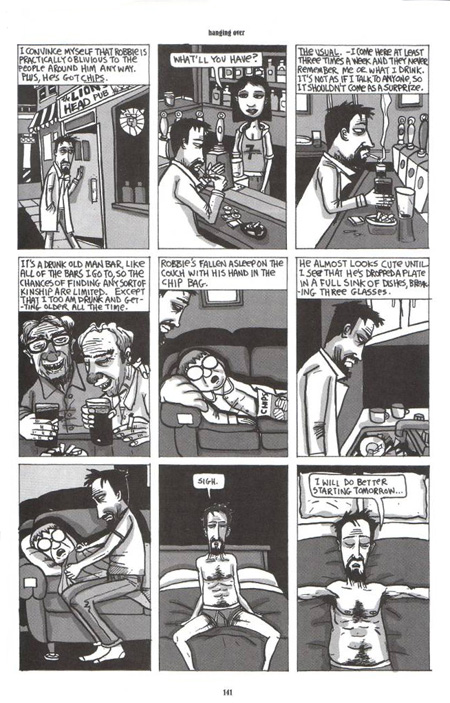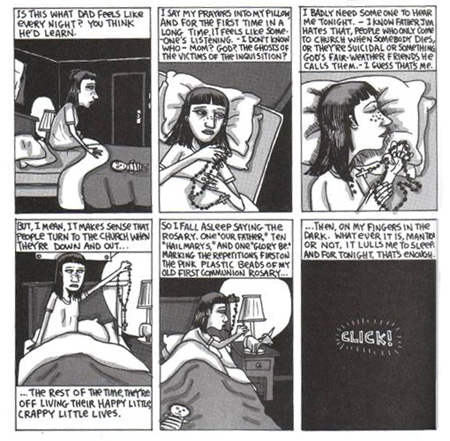 Home > CR Interviews
Home > CR Interviews A Short Interview With Joe Ollmann
posted December 10, 2006
A Short Interview With Joe Ollmann
posted December 10, 2006


At this moment in comics publishing history, a
lot of books are released. Very few of them come without some sort of recognizable legacy, a widely-known body of past works from publisher or author to which the latest one compares. Imagine my surprise when
This Will All End In Tears shows up in the mailbox, from a publisher with whom I'm completely unfamiliar, Canadian literary prose publisher
Insomniac Press, from an author whose work I probably couldn't place in a line-up were I offered $10,000. Turns out that's my fault --
Joe Ollmann has actually been around for several years, produced a similarly-formatted book in less flush publishing times, and is one of several cartoonists to call the great cartooning city of Montreal home.
This Will All End In Tears benefits greatly from Ollmann's maturity. A series of short stories about people with limited resources to deal with outside pressure locked into circumstances that range from aggravating to genuinely troubling, the subject matter for a younger cartoonist might drive a series of nearly intolerable one-pagers, lathering on the pathos. But making judicious use of a nine-panel grid that allows his stories a narrative density, Ollmann builds each short slowly, accumulating detail, layering in a lot of dark humor, driving towards endings that don't compromise the situations but allow for the slightest moves by each character in some significant and unlikely direction. In the end, you realize how few cartoonists make serious attempts at staking out ground in this kind of straight-forward fiction.
I had fun talking to Ollmann, who wanted me to let you know the accompanying photo was done with tongue planted firmly in cheek.
*****
TOM SPURGEON: When your book showed up I have to say your name seemed familiar, but I couldn't quite place it in terms of a wider career. Can you fill me in biography-wise? I'd be interested to know if you went to school, for instance, and where, and where you've published previously.
JOE OLLMANN: Well, I've been drawing comics and cartoons for about 23 years, but mostly in obscure and ultimately futile outlets.
A brief career outline would be something like this: in high school, I copied an
Arthur Sudyam strip from
Epic Illustrated note for note and told everyone that I had made it myself. My only formal art education was a year of community college in an old-school Graphic Arts program where I learned the archaic arts of airbrushing, typesetting, and illustration. I added to the piles of dreck that still gather dust in bargain bins of comic shops everywhere during the black and white comic glut of the early 80's, producing 3 issues of a weirdy-government-conspirac-low-tech-science fiction-y comic called
Dirty Nails Comics.

After the shipping and brokerage fees nearly killed me, I killed the comic and began producing a lower-cost, tiny (4 x 4) square-bound book of comics, cartoons and illustrated fiction called
Wag! in nine volumes over the past 15 years. It was pretty uneven stuff (collected in an arguably-named "best of" compilation
The Big Book of Wag! by
Conundrum Press -- the
Nog a Dod publisher -- in 2005). In the meantime, I was producing a weekly satire strip for five years for a large newspaper. After that, I did a monthly strip in
Exclaim!, a nationally-distributed Canadian entertainment paper for five years.
Exclaim! published a lot of interesting cartoonists back in the day;
Marc Bell,
Jay Stephens,
Dave Cooper and others. They suddenly fired all their cartoonists in a mass email.
Then, Insomniac Press, a literary press in Canada, contacted me in 2000 produce their first-ever graphic novel. The press hype about comics not being just for kids was in swing then, as it is now, as it ever shall be, I suppose. So, I was in the mood to do something more substantial than newspaper funny strips and suddenly had this outlet, so I wrote and drew my first book
Chewing on Tinfoil (165 pages) in less than a year, working only at night, smoking two packs of cigarettes an evening, drinking like three pots of coffee, and gallons of scotch; a cartoonists dreamland, really it would seem. The next book,
This Will All End in Tears, took about five years to do, but I spent a lot of time pissing around eating chips and watching vids, I confess.
SPURGEON: I'm also having an difficult time discerning influences in your work. Are there cartoonists and artists out there that have influenced your work's look?
OLLMANN: I'm so wary of naming influences since the editor of my first book asked me what cartoonists I like and I was like, "Oh,
Edward Gorey,
Charles Schulz,
Ben Katchor," and then, suddenly, these names appeared on the jacket blurb, citing them as influences. And that seems to appear everywhere on the Internet and it's completely obscene for me to be mentioned at the same time as these guys, who are like gods to me. So, I would say that while these people influenced me, it's more just by assimilation of their work and how it permeates the way you think and create I guess.
Visually, I think
Dan Clowes'
Eightball completely blew my mind when it came out and actually got me buying comics again. I think Matt Groening's
Life in Hell stuff was a big influence, I can almost remember making the drawing decision to go the way of the bucked tooth and the bulgy eye, ostensibly to make my work more marketable. Let's just say it's been a real gravy train for me since then.
 SPURGEON: What drove you to Montreal?
SPURGEON: What drove you to Montreal?
OLLMANN: I got divorced after 18 years or so and met a girl in Montreal. I started taking the train there regularly and hanging out with her and her community of artists and musicians in this really beautiful old city. It was all rock shows and art openings and people talking about their paintings and their new music and the book they are writing and it was a big change from my old life of working with people who talked about how clean their houses were and how they were going to buy a bigger house soon. So it was apparent very early that I would probably move to Montreal eventually.
SPURGEON: Are you a part of the world-famous Montreal comics and art communities?
OLLMANN: I wouldn't say I'm really part of the Montreal comics scene. There is a pretty solid group of people who've been getting together for years drawing together, etc. and they have their own style (sort of wordless strange narratives) and they have their own tradition and their own in-fights and all that. I know a lot of them and hang out and am good friend with some cartoonists here, but I'm not really a joiner per se. I am glad that the community exists, though; it's good to be in the middle of it even if I'm not part of it.
SPURGEON: Can you talk about Tears
in terms of how you started doing it, and how the stories developed? I take it from the book that they weren't published elsewhere first, but I could totally be wrong. Did one story simply follow another, or had you dreamed of a suite of stories of the type you ended up publishing? Was it a theme you started out to explore?
OLLMANN: The stories in
This Will All End in Tears are all original and done specifically for the collection. (Publishers take note: I'd love to have a quarterly comic that would be collected at the end of each year in some kind of beautiful volume with French flaps and scholarly introductions.) The only thing I set out to do in this book was to move toward longer stories than in
Chewing on Tinfoil. The books are the same length, 165 pages but the first one had nine stories and this one had five longer ones.
My way of writing is to generally write a straight short story with narration, descriptions of action, scenes, he said, she said and to take that story and adapt it into a comic script, taking the narration I like, fiddling with dialog and using the description for panel layouts. I then break those down into panels and draw my storyboards.

Thematically. it seems I like sad stories. I guess, but I always hope that they are tinged with a sense of humor so they are not mere poe-faced saddy-sad goth-kid bullshit. I hope. Life's never that simple; you can be on top of the world and win the Pulitzer Prize and find the perfect mate or lose one and at the same time cancer could be quietly eating away your colon like a carnivorous little caterpillar. At the same time, even in the most depressed, drunken, suicidal moments of your life, there are those funny moments that intrude and almost make you pissed for disrupting the flow of your beautiful sad-on.
SPURGEON: How did your book end up with Insomniac Press? What have turned out to be the advantages and disadvantages of placing a book with a prose press?
OLLMANN: Insomniac approached me; as I said, I assume they wanted to get into the graphic novel market.
Chewing on Tinfoil got a lot of good reviews in a lot of places. Which was a really nice surprise and they immediately accepted
This Will All End in Tears before they even saw anything. I'm thinking the disadvantages of the graphic novel with the prose press is they don't really know what to do with it, how to market it, where to distribute it. Though with the new book, they have it nailed down much better and they are distributed by Raincoast, the same distributor that handles
Fantagraphics and
Drawn & Quarterly in Canada, so I'm assuming they know what to do with comics. On the positive side, there's a cache attached to being the sole idiot boy comic artist at a literary press; an assumption that your work is accepted as “real†writing.
SPURGEON: Were any of the stories intended for color?
OLLMANN: They were always meant to be black and white. I draw them and scan them and add tones in Photoshop. But the next book I do is going to be no digital, all toning done in ink-wash, like
Alfredo P. Alcala or
Ernie Chan inks in
Savage Sword of Conan or the old
Warren horror mags. I love that look. I guess I like the juxtaposition of the pretty intense story-lines with a drawing style that is not typical of what you would expect in that kind of genre. It works for me, I hope it's not too jarring for people. Also in
This Will All End in Tears, I made a conscious decision to move towards, darker, higher contrast images. Mostly from rereading the telephone book version of
[Steve] Ditko's early
Spider-Man and
Jaime Hernandez'
Locas. I was in awe of the amount of black in those things and I said, "I want some of that; what the hell, ink's cheap, let's use some."
 SPURGEON: Talk to me about the decision to do these stories with a nine-panel grid. When did you make that decision and why?
SPURGEON: Talk to me about the decision to do these stories with a nine-panel grid. When did you make that decision and why?
OLLMANN: A cartoonist said to me the other day, "Ah, the old
Kurtzman solution." I like the nine-panel grid in books that I've read and I like how it works for me. You have to consciously, carefully plan the pacing of a story so that you don't end a dramatic moment in the middle of a page or something. For me, making strange panel shapes would be nothing more than forced showboating because it never naturally occurs to me to do that. I look at the panel border as a TV screen or something and it just seems natural that that would remain static and the shift in focus or angle would occur with that frame. The only time I regret it is when I want to draw something that is short and wide, which presents obvious challenges in a tall and narrow panel.
SPURGEON: How much did doing a nine-panel grid change your approach to page design? There seem to be some pages that are balanced visually while other pages present of a series of images or views upon a reality.
OLLMANN: Well, as I said, it presents challenges mostly in terms of pacing within that structure. I kind of let things occur organically in the storyboard stage and correct obvious imbalances that are easily visible in these thumbnail versions. The other consideration is always asking if you are drawing a panel just because it looks cool to you or is it actually advancing the story. I tend to be less theoretical and just instinctive based on having read millions of comics and watched millions of movies over my life and you can't help but incorporate the visual language from these that works for you when you are taking all of that in.
SPURGEON: One thing that seems to connect the stories in Tears
is the routine of everyday work life and how your protagonists pick up on minute changes and differences in the signals they receive while kind of moving through the day. That's not an observation people would tend to expect of an artist. Have you been subject to that 9-5 experience? Have you felt similarly hyper-aware and trapped as some of your protagonists seem to?
OLLMANN: Oh my God, have I ever lived that 9-5 experience! I've been working full-time without exception since I was 17. I'm 40 now, so yeah, I know office politics very much first-hand and previous to that, I experienced the David Copperfield crap of being a young, sensitive
artiste working in factories. That permeates my psyche and even today is part of my existence. I've had jobs that made me want to put my head in a paper-shredder and it's cathartic to incorporate that into these stories. Also, I think it's important, if comics are going to become accepted as a mainstream, adult medium, that people need to see experiences that they share and can relate to and who can't relate to the mundanity -- mundaneness? -- of work?
 SPURGEON: Can you talk about your endings a bit? There's a lovely thought that seems to connect a few of the stories where the protagonists kind of let themselves off the hook a bit, providing their own moment of grace.
SPURGEON: Can you talk about your endings a bit? There's a lovely thought that seems to connect a few of the stories where the protagonists kind of let themselves off the hook a bit, providing their own moment of grace.
OLLMANN: The endings are something I am adamant about; if it's explicitly happy, I feel like I've failed to represent life. It's never that simple. I'm not a depressing guy, but I feel cheated by openly-happy endings in entertainment, in fact, I wait for the final kick in the guts and go, "Ah!"
But at the same time, nothing is ever entirely black and bleak either, so there's always the tiny peep of the voice of hope thrown in there. I really work at the endings; so they bookend with the beginning, so they aren't simply anti-climatic, but especially so they aren't neat, simple or framed around momentous events for effect. I'd almost rather end before the momentous event occurs and make something out the reaction to the impending, if that makes sense. I tend to like these characters and I'm glad they they give themselves a break at the end, I'd hate to end a story like "Big Boned" on a note that was completely downbeat after all the character has been through, but at the same time I'd hate to simplify it so that one event can't change everything immediately.
Ultimately, I hope the endings are more balanced than bleak.
SPURGEON: So what's next?
OLLMANN: I was ready to stop making comics after I finished
This Will All End in Tears. I had struggled to get it done, had just turned 40 and felt undignified pursuing such a juvenile art form and I wasn't showing the finished stories to anyone, so I only had my own feedback. But the reaction to the book by people has been really positive and I find I'm drawn back into the ungainly fray. I'm pretty fired up about two projects which will both be full-length graphic novels. One is a biographical work about an alcoholic travel writer from the 30's and the other is fiction about a midlife crisis, children's performers and failed rockstars. Pretty much auto-biography, really.
*****
*
publicity photo, provided by the artist
*
a moment of dark humor, from "Oh Deer"
*
from a strip not in Tears
about encountering the French language in Montreal
*
another moment from the deer story
*
a typical full page from the book
*
one of the endings from the book, from "They Filmed a Movie Here Once."
*****
This Will All End In Tears, Joe Ollmann, Insomniac Press, 2006 $16.95, 1897178069 (ISBN)
*****
*****


